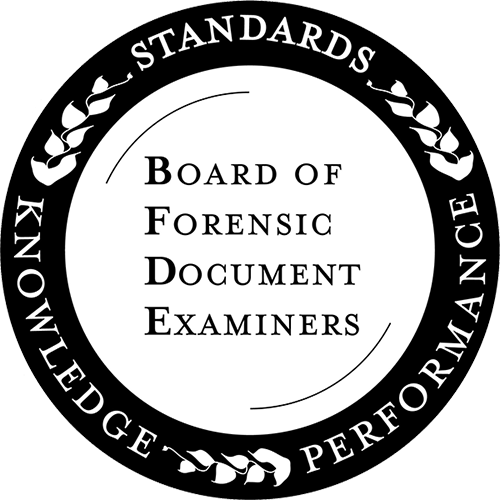Board of Forensic Document Examiners
FAQs
Is Board Certification necessary?
Board certification should be one of the top considerations when choosing a forensic document examiner (FDE) for case work. Board certification is an official recognition given to FDEs who have met specific requirements set by their board and passed the requisite testing. Sitting for board certification testing indicates the individual has enough confidence in his or her abilities to participate in an objective testing situation. Does this mean that if an individual is not board certified then he or she is not competent? No, of course not, but it is assurance that the board certified individual passed stringent testing that another individual was not interested in doing.
Board certification should be one of the top considerations when choosing a forensic document examiner (FDE) for case work. Board certification is an official recognition given to FDEs who have met specific requirements set by their board and passed the requisite testing. Sitting for board certification testing indicates the individual has enough confidence in his or her abilities to participate in an objective testing situation. Does this mean that if an individual is not board certified then he or she is not competent? No, of course not, but it is assurance that the board certified individual passed stringent testing that another individual was not interested in doing.
Are all certification boards equal in requirements and practices?
No. Anyone organization or group of people can set up “a board” and offer certification. It was for this reason that the Forensic Specialties Accreditation Board was established with the support and grant assistance of the American Academy of Forensic Sciences (AAFS), the National Forensic Science Technology Center (NFSTC) and the National Institute of Justice (NIJ). FSAB was incorporated in 2000. Accreditation, as certification, is optional, but accreditation shows that the board was willing to put their certification programs up for review before the FSAB. If the board meet the prescribed criteria it would become accredited. The BFDE was the first certifying body for forensic document examiners to earn accreditation by FSAB (2006). FSAB currently accredits 15 certifying bodies within the forensic area. (www.thefsab.org). Every five years a board must reapply for renewal of their accreditation.
FSAB, unfortunately, does not have a requirement that all phases of testing be proctored. The BFDE, on the other hand, believes strongly that all phases of certification testing should be proctored. Board certification is the highest credential an FDE can earn in the profession and proctoring not only protects the security and integrity of the test itself, but assures the test-taker has the knowledge and skills to pass the testing without any assistance. The BFDE test is administered at a university test proctoring center.
No. Anyone organization or group of people can set up “a board” and offer certification. It was for this reason that the Forensic Specialties Accreditation Board was established with the support and grant assistance of the American Academy of Forensic Sciences (AAFS), the National Forensic Science Technology Center (NFSTC) and the National Institute of Justice (NIJ). FSAB was incorporated in 2000. Accreditation, as certification, is optional, but accreditation shows that the board was willing to put their certification programs up for review before the FSAB. If the board meet the prescribed criteria it would become accredited. The BFDE was the first certifying body for forensic document examiners to earn accreditation by FSAB (2006). FSAB currently accredits 15 certifying bodies within the forensic area. (www.thefsab.org). Every five years a board must reapply for renewal of their accreditation.
FSAB, unfortunately, does not have a requirement that all phases of testing be proctored. The BFDE, on the other hand, believes strongly that all phases of certification testing should be proctored. Board certification is the highest credential an FDE can earn in the profession and proctoring not only protects the security and integrity of the test itself, but assures the test-taker has the knowledge and skills to pass the testing without any assistance. The BFDE test is administered at a university test proctoring center.
How was BFDE board certification testing developed?
The BFDE test was developed under the direction of a professional test development company that, among other clients, works with a number of forensic boards (Occupational Research and Development),. A summary of the BFDE test development process can be found here. A committee reviews the test every three years for updating. Certificate holders are required to renew their certification every five years by meeting established criteria, which includes continuing education.
The BFDE test was developed under the direction of a professional test development company that, among other clients, works with a number of forensic boards (Occupational Research and Development),. A summary of the BFDE test development process can be found here. A committee reviews the test every three years for updating. Certificate holders are required to renew their certification every five years by meeting established criteria, which includes continuing education.
